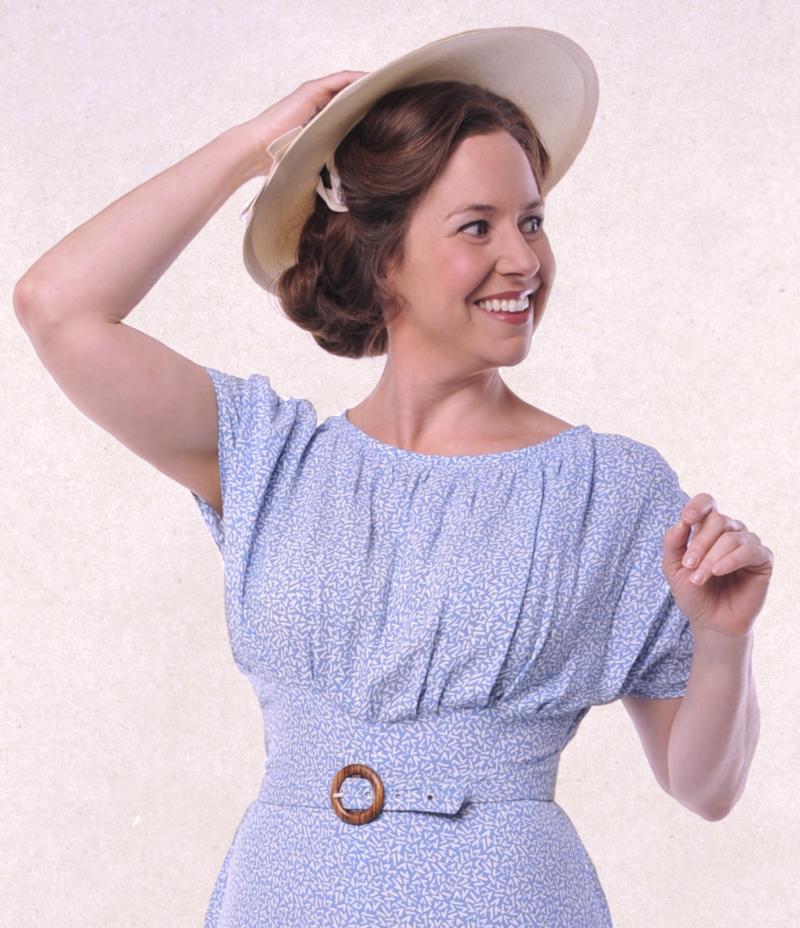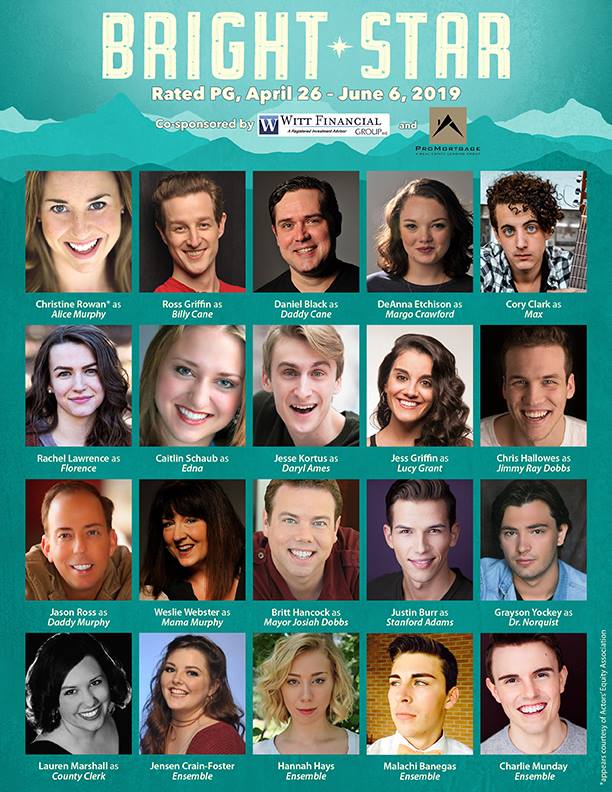Review: Christine Rowan is a Revelation in Cumberland County Playhouse's BRIGHT STAR

"Based on a true incident" seems a phrase best reserved for a hardboiled television detective series, circa 1954 - perhaps followed by a title card reading, "A Quinn Martin Production" (if you're of a certain vintage, you'll get my meaning) - but in the case of Bright Star, the Tony Award-nominated musical by Steve Martin and Edie Brickell now onstage at Cumberland County Playhouse through June 6, it's definitely fitting.
By turns inspiring and moving, heartfelt and nostalgic, Bright Star is another onstage triumph for the cast, crew and creative team at Cumberland County Playhouse who have brought the show to life with such impressive artistry. In fact, Bright Star is as stunning a piece of musical theater you may ever hope to experience. The music instantly transports you to another time and place: North Carolina in 1946 (and even further back to 1923 for a time-shifting adventure that is somehow never confusing or off-putting), in a way that seems effortless yet is indicative of the tremendous talents of the assemblage of people who have crafted a production which packs an emotional wallop with its timeless tale of heartbreak and redemption that guarantees a powerful response.
So engaging is the musical - so transformative its story, so completely appealing its characters - that the power of its startling story comes over you almost without warning. Thankfully, that level of instant engagement ensures you will be riveted to the tale as it unfolds onstage before you from the very earliest moments ("If You Knew My Story," a spellbinding opening number that perfectly sets the tone for Bright Star) to the show's finale that wobbles - almost imperceptibly if one isn't an aficionado of classic musical comedy tropes - toward a jarring musical theater climax that the writers manage to sidestep with more than a little grace, literary dexterity and self-awareness.
The musical score is evocative of the time period in which the play is set, with the plaintive strains of bluegrass infusing a very real sense of place and purpose for the show. Yet there is a very contemporary feel to the pace and timing of Bright Star that makes it accessible for today's audiences. The score gives choreographer Jensen Crain-Foster an opportunity to put her own theatrical bona fides on full display, creating dance movement to further the plot along in such a way that seems organic and genuine.
The characters in Bright Star are so vividly etched, so devastatingly familiar, that your heart is flooded with memories of similar stories kept somewhere deep in the repository of your mind, only to resurface at the behest of the script-driven action. You find yourself captivated by what is happening onstage and caught up by the day-to-day drama in the lives of the people enacting the story that you become lost in it, the story's fictional elements becoming commingled with your own life's story in such effortless fashion that you're hard-pressed to divine the difference.

Credit Martin and Brickell (both of whom were born in Texas) for following the long line of Southern-born and bred writers to tell this story with a blend of breathtaking honesty and boundless imagination in the tradition of Thomas Wolfe, Carson McCullers, Eudora Welty, William Faulkner, Katherine Anne Porter, Ellen Gilchrist, Walker Percy, Tennessee Williams, Truman Capote and any number of other writers who hail from below the Mason-Dixon Line who write so acutely, yet so matter-of-fact, of their home and their people. As Alice Murphy (played by the luminous, gracious and vibrant Christine Rowan), the protagonist of Bright Star claims to fledgling author Billy Cane (Ross Griffin in yet another performance that underscores his versatility), "it'd be easier to take Abraham Lincoln's face off Mount Rushmore than it would be to take 'home' out of the heart of a Southern writer" (or words to that effect - I was too "caught up" in the story happening before my eyes to take notes, truth be told).
We meet literary journal editor Alice (her periodical is based in Asheville) in 1946 as she is about to share the hard to believe story of her life, becoming immersed in the tale of people and places in the not-so-distant that have shaped her into the hard-working, somewhat cynical and diffident, post-war Southern woman we first encounter. Among those we meet in the play's first few moments is Billy Cane, a callow youth just returned from World War II who dreams of joining the pantheon of Southern literary greats and it quickly becomes evident his career path is destined to intersect with Alice's.
The play's action takes a not entirely unexpected turn back to 1923, as Alice tells of her coming of age in Zebulon and of a budding romance with Jimmy Ray Dobbs (played by Chris Hallowes, whose ample charm and good looks seem to define the term "matinee idol" in only the best possible way), the scion of a well-to-do local family, with whom she falls in love. Concurrently, we get to know Billy's hometown sweetheart in Hayes Creek, Margo (DeAnna Etchison fairly radiates youthful innocence and undeniable appeal) who supports his decision to pursue a writing career in Asheville while hoping against hope that he will return to claim her hand in marriage.
While the story is sweetly romantic and somewhat sentimental, like the very best of Southern literature, it takes on a deeper, far more dramatic tone as Alice's and Billy's stories become inextricably connected. As with a good many Southern stories of similar ilk, a Gothic element emerges. It would be too easy to interpret the story that comes out as melodramatic, perhaps even horrific, but there is something about it that remains steadfastly believable and devastatingly familiar.
Martin and Brickell approach the story with an even-handed grace, filling it with characters who are tremendously relatable and accessible, thus ensuring the play's emotional impact. While the script sometimes walks a very fine line to create genuinely affecting drama instead of succumbing to precarious soap operatic overtones (how easily that could have happened!), the pair show amazing restraint - and Bright Star is more the better for it.
Directed by Bryce McDonald with a knowing and discernible hand that allows the sometimes hard-to-believe story to play out naturally for maximum impact - the story's melodramatic elements could easily overwhelm the sweet sincerity and palpable authenticity of Bright Star - and he allows his impressive ensemble of actors to bring a story to life in such an unaffected way that the audience gladly acquiesces to even the most farfetched of plot-driven possibilities.
Rowan is a revelation as Alice Murphy, managing to play her at 16 and 40 with equal capabilities, effectively showing us a young woman filled with the hopes and dreams of generations of her forebears which contrasts intriguingly with the more worldly Alice - a woman buffeted by the travails of a hard-won life. She moves forward and backward so easily that it will, quite frankly, take your breath away. Rowan's onstage chemistry with Hallowes is exquisitely felt, which allows him to soar with a performance that reads as surprising even as it is completely expected of him. Musically, Rowan appears to invest the whole of her heart and soul into every musical number entrusted to her and, likewise, so does Hallowes. In short, their pairing is ideal and certain to color your perceptions of who you're likely to see in the roles in the future (make no mistake about it, Bright Star will be seen often in the coming seasons).
Griffin's confident stage presence is nothing short of amazing - is there nothing this man can't do onstage? - and he adds another impressive credit to his already staggering resume. He interacts effortlessly with every other character onstage (whether it's Etchison's lovely Margo or his real-life bride Jess Griffin's acerbic and entertaining Lucy), imbuing his character with down-to-earth affability. Etchison, who has grown up on the CCP stage, shows off her own range as Margo, creating a memorable portrayal in the process that augurs an awesome theatrical future.
Speaking of stage presence, Daniel Black's customary warmth breathes life into his role as Billy's daddy, while another CCP favorite - Britt Hancock, the company's artistic director - takes on the role of Jimmy Ray's dastardly father with his expected gravitas. As Alice's dad, Jason Ross is superb, able to craft a full-bodied performance during his brief time onstage that is certain to leave you spent, so emotionally charged is his characterization. Similarly, Weslie Webster's striking performance as Mama Murphy is memorable for her measured and understated reading of the role and her plaintive reprise of "Sun's Gonna Shine" is likely to bring you to tears.
 As the sophisticated, cynical and world-weary staffers at Alice's literary journal offices, Jesse Kortus (as Daryl Ames) and the aforementioned Jess Griffin (as Lucy Grant) very nearly steal the show in every scene in which they crack wise and provide comic relief - their "Another Round," performed with Ross Griffin and McDonald's triple-threat ensemble, is a rollicking highlight of the show's second act.
As the sophisticated, cynical and world-weary staffers at Alice's literary journal offices, Jesse Kortus (as Daryl Ames) and the aforementioned Jess Griffin (as Lucy Grant) very nearly steal the show in every scene in which they crack wise and provide comic relief - their "Another Round," performed with Ross Griffin and McDonald's triple-threat ensemble, is a rollicking highlight of the show's second act.
Among the other supporting characters, Cory Clark is delightful as the lovestruck Max, Rachel Lawrence and Caitlin Shaub make their mark as Margo's friends and co-workers and Justin Burr and Grayson Yockey provide strong performances in support of Hancock's Josiah Dobbs' nefarious machinations. Hannah Hays, Charlie Munday and Malachi Banegas are among the stand-out performers who grace the show's ensemble with their consummate skills.
Music director Lauren Marshall (who makes a brief, if thoroughly indelible impression, as a helpful county clerk) and her musicians - Ron Murphy, Rachel Baiman, David Garrison, Tony Greco, Chet Hayes, Jacob Miller, Daniel Black and Cory Clark - play the Martin and Brickell-written score with confidence, professionalism and theatricality. They are onstage throughout the show's two-and-a-half hours and audiences would be advised to study their expressions for an accurate reading of the play's impact.
Adam Miecielica's gorgeous set design provides the perfect backdrop for the play's action and it is beautifully lighted by Christopher Van Tuyl to illuminate the story. Costume designer Andy Wallach tastefully clothes his characters with period-perfect style and Crissy Varnell's subtle projection design lends an another ideal element to the show's aesthetic.
Bright Star. Music, book and lyrics by Steve Martin. Music, lyrics and story by Edie Brickell. Directed by Bryce McDonald. Musical direction by Lauren Marshall. Choreography by Jensen Crain-Foster. Presented by Cumberland County Playhouse, Crossville. Through June 6. For details, call (931) 484-5000 or go to www.ccplayhouse.com for tickets. Running time: 2.5 hours (with one 15-minute intermission).
Reader Reviews

Videos

